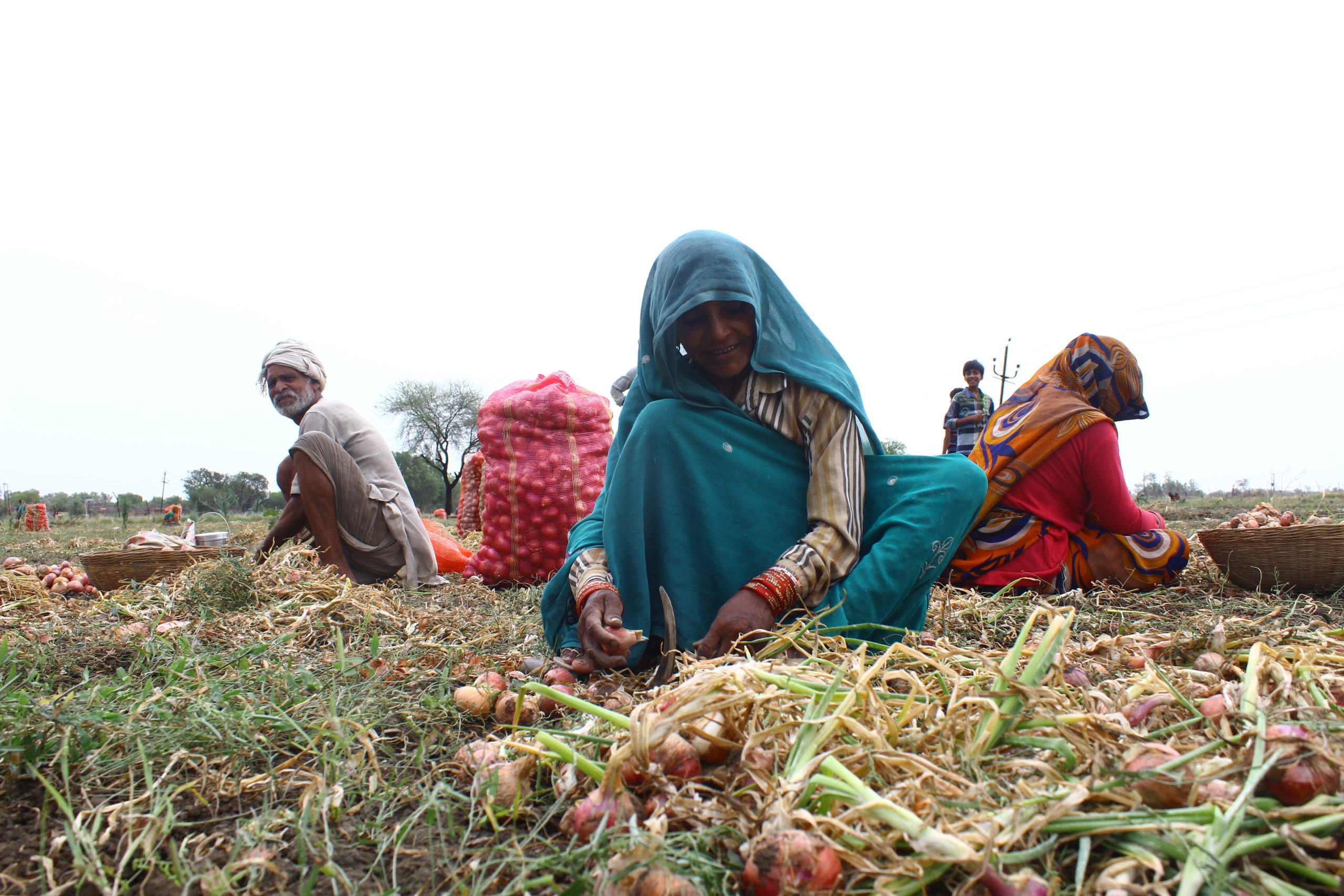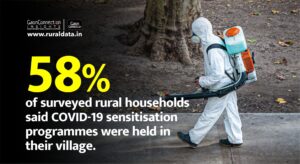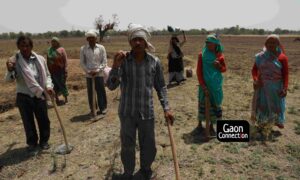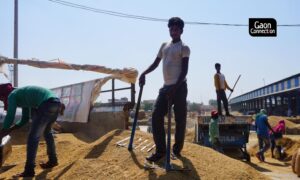Every year farmers across India pray for a bumper crop, good rains and a fair price for their produce. Some face disappointments along the way tackling either droughts or floods.
However, no one expected a corona virus pandemic prompted lockdown which threw the entire sow-harvest-sell cycle awry bringing tears, untold miseries and hunger into the lives of millions of farmers.
Bal Mukund Dangi, a farmer from Jhalawar in Rajasthan, said he had wanted to take 2 trolleys (40 quintals) of cucumber to Jaipur end March to sell but was not allowed by the police. Finally he ended up feeding the cucumbers worth Rs 60,000 to cows, he told Gaon Connection.
At least 50 per cent of the farmers did manage to harvest their crops in time despite the lockdown. Twenty eight per cent sold in time, a survey found.
The national survey was conducted between May 30 and July 16, 2020.
State wise, 77 per cent of the farmers in Rajasthan were able to harvest on time, 49 per cent could sow on time and only 45 per cent could sell in time. Only 10 per cent were able to harvest on time in Jammu and Kashmir and Ladakh and 2 per cent were able to sell their crops in time.
Farmers in Chhindwara and adjoining districts of Madhya Pradesh too faced a problem of taking their harvest of oranges and kinu to the mandis. The fruit was rotting but even the traders could not reach the farmers due to the lockdown.
A majority of the farmers could not harvest the crop in time, those who did were unable to take it to the mandi and some who did reach the market failed to get a fair rate from the wholesalers or procurement centres.
Gaon Connection Survey is the largest survey of rural India post lockdown, an inquiry into the hardships faced by the farmers during the period and the future course of action. Watch an exclusive talk with renowned agriculture and food expert Devinder Sharma … under Gaon Café.
The farmers who had cultivated perishable crops of vegetables and fruits suffered huge losses. 41 per cent of the farmers involved in the Gaon Connection survey said they could not harvest their crops in time due to lockdown, while 55 per cent of the farmers could not sell their produce in time. About 38 per cent of the farmers had to sell their produce to private traders.
In Karnataka, Kannaiah Subramaniam, a farmer from Chamraj Nagar had tweeted on April 18 about his produce of one lakh cabbages wilting in his three and a half acre farm for want of takers. He said it had cost him Rs 4 lakhs to cultivate the cabbages.
The hardships of the farmers continued even after the unlock started in every state. In Maharashtra, the farmers in Nashik could not sell grapes and procurement of wheat in several states including Uttar Pradesh could only begin after a delay of 15 days.
The survey found that 52 per cent of farmers were able to harvest the crop on time, while 41 per cent could not and 6 per cent did not respond. 38 per cent of the farmers said they were able to sow in time, 42 per cent failed to do so and 20 per cent provided no answer. 55 per cent of farmers said they could not sell their produce in time while 28 per cent sold in time and 17 per cent did not answer the question.
In Uttar Pradesh, 65 per cent of the farmers were able to harvest crop on time, 47 per cent could sow on time, while 35 per cent were able to sell in time. In Bihar, 35 per cent of the farmers were able to cut the crops in time while 34 per cent did in West Bengal.
It was found that farmers who sold their crops to private traders got a price lower than the minimum support price (MSP). 32 per cent of the farmers who had sold the crop to private traders admitted getting price lower than the MSP, while 58 per cent said the price was equal to MSP, while only 5 per cent said they got a better rate than MSP. 6 per cent did not respond.
The survey found that 72 per cent of the farmers had cultivated on their own land, while 7 per cent had taken up contractual farming. 10 per cent of the farmers had cultivated both and the land under contract while 11 per cent did not specify the ownership of the land they were cultivating upon.
The survey, based on face-to-face detailed interviews with 25,300 respondents, was carried out in 179 districts across 20 states and three Union Territories by Gaon Connection Insights, the data and insights arm of India’s largest rural media platform. The survey was designed and data analysed by the New Delhi-based Centre for Study of Developing Societies (Lokniti-CSDS).
These survey findings have been put together in the form of a report – The Rural Report – by Gaon Connection. This exhaustive 200-page report is the first set of national insights documenting the post-COVID-19 impact on rural India (For complete details, visit www.ruraldata.in). The report is divided into different themes that include the impact on farmers, financial stress and debt, livelihoods and MGNREGA, pregnant women’s health, hunger, future plans of rural citizens, etc.
The states where the survey was conducted included Rajasthan, Punjab, Haryana, Himachal Pradesh, Uttarakhand, Bihar, Uttar Pradesh, Jharkhand, West Bengal, Sikkim, Assam, Arunachal Pradesh, Manipur, Tripura, Odisha, Kerala, Maharashtra, Gujarat, Madhya Pradesh and Chandigarh, besides, the survey was also conducted in Jammu and Kashmir, Ladakh, Andaman and Nicobar Islands.
In the survey, the main breadwinner of the house was interviewed and a separate survey was conducted among the lockdown returnees that were 963 in number. The national survey was conducted between May 30 and July 16, 2020.
“Based on the diversity, breadth and sample size of the survey, I can definitely say that this is the first comprehensive survey of its kind, which focuses on the impact of lockdown on rural India,” Sanjay Kumar, the professor at CSDS, New Delhi said.
Also Read: Almost every fourth migrant worker returned home on foot during the lockdown.
Also Read: 58% pregnant women in villages confirmed checkups, vaccination in the lockdown.
Also Read: 80% rural citizens reported not getting work under MGNREGA during the COVID-19 lockdown.
Also Read: 23% rural citizens borrowed money during the COVID-19 lockdown.
Also Read: Three-fourth poor households without ration card didn’t receive government ration in lockdown.



















